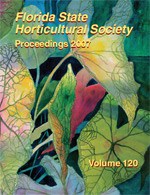Abstract
Annual studies have been conducted since 1999 to evaluate the effectiveness of preharvest applied compounds in reducing postharvest decay of many types of fresh citrus fruit (Citrus spp.). Commercially mature fruit were usually harvested at two different times after the compounds were applied, degreened when necessary, washed, waxed (without fungicide), and then stored at 50 F (10.0 C) with about 90% relative humidity. Compared to control (unsprayed) fruit, preharvest application of benomyl (Benlate) or thiophanate-methyl (Topsin) most often resulted in significantly (P < 0.05) more healthy citrus fruit and less decay from stem-end rot (SER; primarily Lasiodiplodia theobromae or P Phomopsis citri) after storage, often reducing total decay by about half. Pyraclostrobin (Headline), pyraclostrobin + boscalid (Pristine), and phosphorous acid (Phostrol) only occasionally reduced decay from SER or anthracnose (Colletotrichum gloeosporioides). None of the other tested materials reduced postharvest decay or increased the number of healthy fruit after storage.

